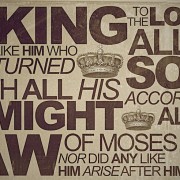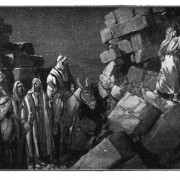If there’s one thing my own heart has convinced me of, and my interactions with other Christian’s has taught me time and time again, it is that many Christians in the west expect God to provide us with a comfortable Christianity. We gauge whether or not God is calling us to serve Him by cost, comforts, and conveniences we may have to sacrifice. If we feel called to something that will cost more money than we’d like to spend, think we have, or can provide, we conclude the feeling must not be from God. If we sense the nudge of the Holy Spirit toward a project or person that would cause us discomfort (physically or emotionally), we back out. If serving some way is just inconvenient, either at church or elsewhere, many Christians conclude God must not be leading, or things would just go smoothly.
Comfortable Christianity Slogans
Here are some of my favorite statements I hear, and some I’ve said, which demonstrate our expectation of a comfortable Christianity:
“If I’m stressed out, it means I’ve taken too much on and need to let something go.” (Comfort)
“We want to come to church, but we live fifteen minutes across town.” (Convenience)
“We want to tithe, but money’s a little tight right now.” (Cost)
“We’d love to go to a small group, but I have to rush home, eat quickly, and get the family packed up in a hurry, and by that time we’re just stressed. Going to Bible study as a family shouldn’t be stressful.” (Convenience/Comfort)
“I meant to come to the once per quarter discipleship event at church, but Saturdays are when I sleep in.” (Convenience)
“I know those people need help, but my kids can’t miss their nap.” (Convenience/Cost/Comfort)
“We haven’t been at church in three months because it’s SUMMER!” (Convenience/Comfort)
God’s Not a Kill-joy
Now, to be clear, I’m not saying all of the above statements are sinful every time they’re made. For instance, sometimes a kid just needs a nap. But too often, these kinds of things become excuses for not wanting to suffer in any way, to be part of the body of Christ, or serve people. The truth is, biblical Christianity includes the call to joyfully suffer. If our Christianity is the Christianity of the Christ, it will mean great cost at times, to us and our families. It will mean inconvenience, and it will mean discomfort. It will include things like only camping two weeks in the summer with your family instead of ten, specifically so you can serve your church and community on the other weekends. It may include kids going without naps, stressful drives to the prayer meeting, spending money you don’t have because God promised to provide, and sacrificing days off on the couch, for days off in the trench serving God.
Jesus and the Apostles
Consider a few verses, and ask yourself if they represent legitimate potential experiences in your life, based on how you live out your version of the Christian life:
Matthew 8:19-20: “Then a certain scribe came and said to Him, ‘Teacher, I will follow You wherever You go.’ And Jesus said to him, ‘Foxes have holes and birds of the air have nests, but the Son of Man has nowhere to lay His head.’” That’s right. Jesus was telling this dude that he may have to sleep on the street to follow Jesus faithfully. What if following Jesus meant that for you? Would you write off His call to sacrifice as the voice of the Devil? Some would conclude that Satan was the one speaking if they were merely being asked to give up a spare room to a guest, let alone their entire house.
Matthew 16:24-25: “Then Jesus said to His disciples, ‘If anyone desires to come after Me, let him deny himself, and take up his cross, and follow Me. For whoever desires to save his life will lose it, but whoever loses his life for My sake will find it.’” That’s a tough cost to ponder. As John Piper reminded a group of students in regard to this passage, “The cross isn’t some annoying person sitting next to you in history class. The cross is the place where you die with nails driven through your hands and feet, while the crows eat your eyes out.” Jesus’ point is that truly following Him will feel like that spiritually at times for us all. And for some, they will literally be called to die for the faith, as He did.
Acts 5:41- “So they departed from the presence of the council, rejoicing that they were counted worthy to suffer shame for His name.” This was the response of the apostles when they were persecuted for their faithfulness to Jesus and His gospel. Most of us would think God was punishing us if He allowed us to suffer for Christ.
1 John 3:16- “By this we know love, because He laid down His life for us. And we also ought to lay down our lives for the brethren.” This one is brutally plain, but true, and needs no elaboration.
What about You?
So, does your version of Christianity demand comfort, or is it real and biblical Christianity? Christians worship the crucified Christ, a suffering Savior. If you follow Him, you should expect to meet His experiences. And yet, the mystery of Christ is that He can grant a greater joy in giving, and suffering, than we experience when we avoid such things at all costs. The paradoxical thing is that when we avoid cost, inconvenience, and discomfort, we actually avoid joy, blessing, spiritual maturation, usefulness, and sanctification, which, at some levels, the Holy Spirit only uses the tool of suffering to provide.
I leave you with two quotes to pray over today:
“We are hard-pressed on every side, yet not crushed; we are perplexed, but not in despair; persecuted, but not forsaken; struck down, but not destroyed– always carrying about in the body the dying of the Lord Jesus, that the life of Jesus also may be manifested in our body. For we who live are always delivered to death for Jesus’ sake, that the life of Jesus also may be manifested in our mortal flesh.”[1] –The Apostle Paul
“We can only achieve perfect liberty and enjoy fellowship with Jesus when His command, His call to absolute discipleship, is appreciated in its entirety. Only the man who follows the command of Jesus single-mindedly, and unresistingly lets His yoke rest upon him, finds His burden easy, and under its gentle pressure receives the power to persevere in the right way. The command of Jesus is hard, unutterably hard, for those who try to resist it. But for those who willingly submit, the yoke is easy, and the burden is light. ‘His commandments are not grievous’ (1 John 5:3). His commandments are not some sort of spiritual shock treatment. Jesus asks nothing of us without giving us the strength to perform it. His commandment never seeks to destroy life, but to foster it, strengthen and heal it.”[2] –Dietrich Bonhoeffer
[1] 2 Corinthians 4:8-11 NKJV
[2] Bonhoeffer, Dietrich. The Cost of Discipleship. Page 38.










